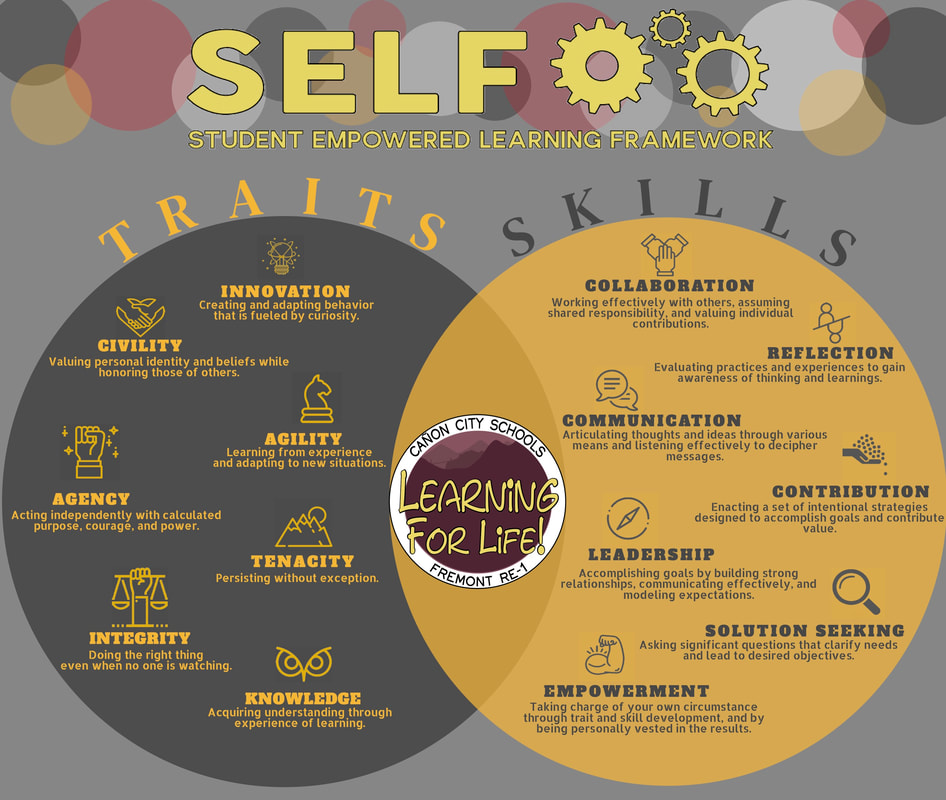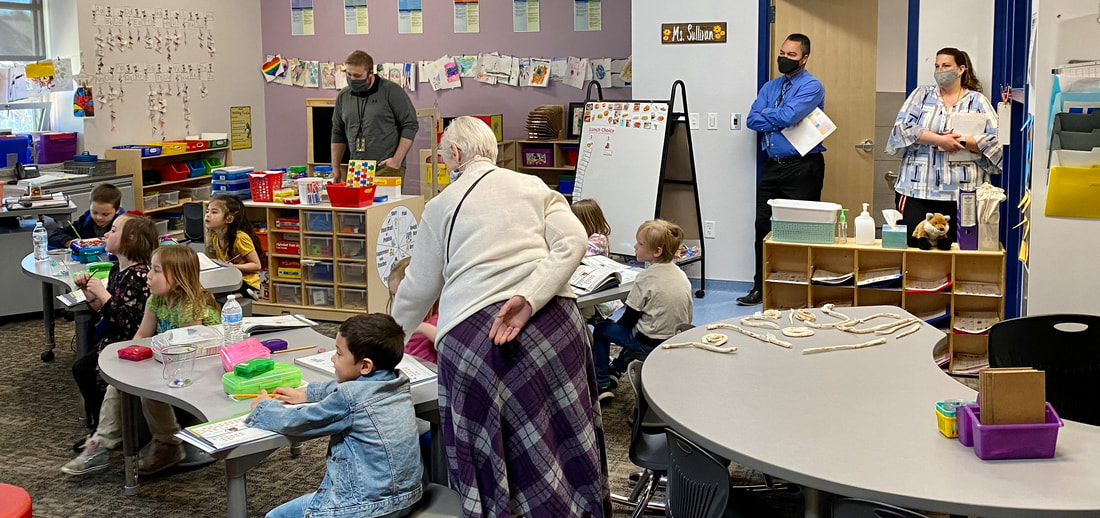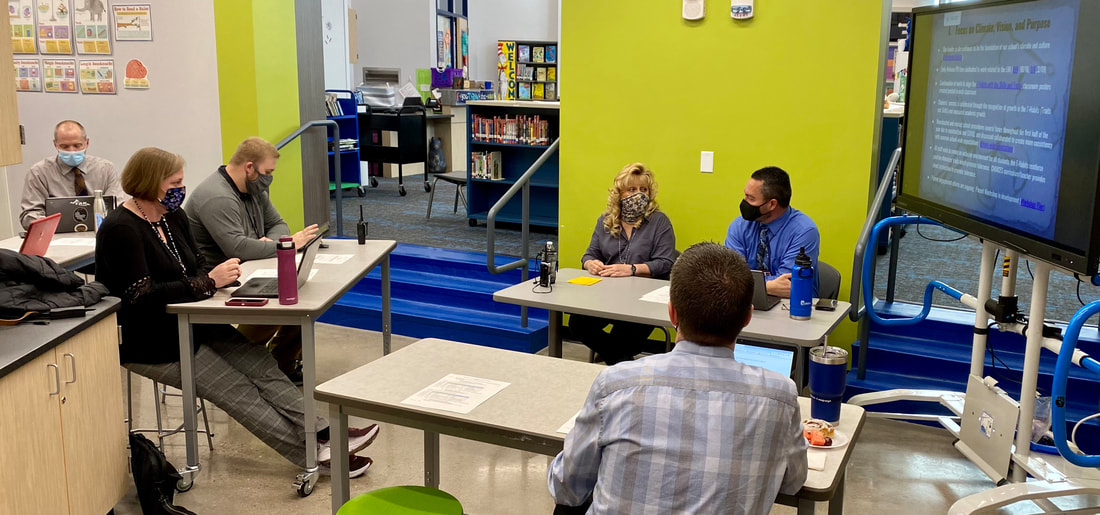Washington 2021 Instructional Program Review
What An Instructional Program Review Is
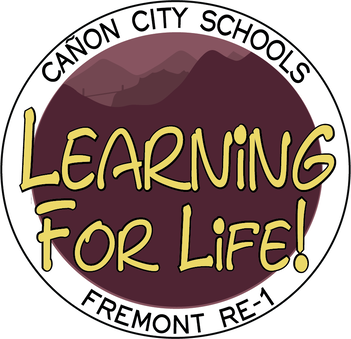
Purpose of this Process
The Cañon City School District believes by taking an in-depth look at each of its schools on an annual basis, through the lens of what it collectively strives to achieve as an educational system, it will identify opportunities for improvement and growth to assist schools in more effectively reaching their goals.
As we have created this vision for ourselves, we also believe we have the capacity within ourselves to conduct this process in a fair and equitable manner.
Plan for Implementation
Building site reviews take place each school year prior to Spring Break, with the goal of reporting results back to each staff and each school community by the end of each year.
In preparation for an annual review, each school leadership team prepares by creating a collective self-reflection of the agreed upon rubric. The Compass Committee, comprised of students, staff, parents, administrators, board members and key community leaders, appoints a review team to consist of the superintendent of schools, the assistant superintendent of schools, a selection of appropriate directors, at least one school principal (not assigned to the school being reviewed), a group of appropriate instructional coaches/coordinators, staff, and students. At least one board of education member will also participate in each site review process.
Site reviews are conducted over the course of a full school day and include opportunities for staff to present information and artifacts to the visiting team, as well as opportunities for the visiting team to observe live instruction.
Official results are formally reported to each staff and school community by the superintendent and assistant superintendent of schools after the Compass Committee approves them.
Each certified staff member will use their school’s final rating as a collective measure on their personal evaluation in lieu of their School Performance Rating if they so choose.
The 2020-21 Compass Committee consisted of the following members: George Welsh, Adam Hartman, Tim Renn, Bill Summers, Jesse Oliver, Marne Autobee, Kelly Albrecht, Jessi Hamilton, Karen Sartori, Brian Zamarripa, Scott Morton, Garrett Olguin, Jamie Eads, Ryan Brown, Mark Peacock, Larry Oddo, Ashley Smith, Brian Turner, Brad Rowland, Hope Kolman, Sean Williamson, Mary Kay Evans, Kelli Jones, and Beth Gaffney.
The Cañon City School District believes by taking an in-depth look at each of its schools on an annual basis, through the lens of what it collectively strives to achieve as an educational system, it will identify opportunities for improvement and growth to assist schools in more effectively reaching their goals.
As we have created this vision for ourselves, we also believe we have the capacity within ourselves to conduct this process in a fair and equitable manner.
Plan for Implementation
Building site reviews take place each school year prior to Spring Break, with the goal of reporting results back to each staff and each school community by the end of each year.
In preparation for an annual review, each school leadership team prepares by creating a collective self-reflection of the agreed upon rubric. The Compass Committee, comprised of students, staff, parents, administrators, board members and key community leaders, appoints a review team to consist of the superintendent of schools, the assistant superintendent of schools, a selection of appropriate directors, at least one school principal (not assigned to the school being reviewed), a group of appropriate instructional coaches/coordinators, staff, and students. At least one board of education member will also participate in each site review process.
Site reviews are conducted over the course of a full school day and include opportunities for staff to present information and artifacts to the visiting team, as well as opportunities for the visiting team to observe live instruction.
Official results are formally reported to each staff and school community by the superintendent and assistant superintendent of schools after the Compass Committee approves them.
Each certified staff member will use their school’s final rating as a collective measure on their personal evaluation in lieu of their School Performance Rating if they so choose.
The 2020-21 Compass Committee consisted of the following members: George Welsh, Adam Hartman, Tim Renn, Bill Summers, Jesse Oliver, Marne Autobee, Kelly Albrecht, Jessi Hamilton, Karen Sartori, Brian Zamarripa, Scott Morton, Garrett Olguin, Jamie Eads, Ryan Brown, Mark Peacock, Larry Oddo, Ashley Smith, Brian Turner, Brad Rowland, Hope Kolman, Sean Williamson, Mary Kay Evans, Kelli Jones, and Beth Gaffney.
Our Profile of a Graduate
Section I-Focus on Climate, Culture, Vision, and Purpose

Staff Reflection
We continue to utilize The Leader in Me (LIM)as the foundation for our school's climate and culture and continue working toward making progress in our efforts to implement LIM practices in spite of the challenges created by our current circumstances with COVID restrictions. We have been able to improve our student leadership roles and increase the types and number of roles offered while adhering to expected guidelines to minimize risk to students and staff. We have also been able to review and display the work we put into place last year with our alignment of the 7-Habits with the district identified skills and traits by printing/laminating posters for every classroom. Although we couldn't involve parents in our trimester awards presentation, we continue to utilize our awards system to recognize students for their growth in developing and demonstrating leadership by achieving "The Private Victory", which is all about personal responsibility and independence; "The Public Victory", which is all about working with others and interdependence; and for overall "Leadership" by consistently demonstrating the use of the 7-Habits in their daily lives. We also recognize students for academic growth by using DIBELS Pathways Growth for all grades (CMAS growth could not be utilized this year for 4th and 5th grades).
We continue to utilize The Leader in Me (LIM)as the foundation for our school's climate and culture and continue working toward making progress in our efforts to implement LIM practices in spite of the challenges created by our current circumstances with COVID restrictions. We have been able to improve our student leadership roles and increase the types and number of roles offered while adhering to expected guidelines to minimize risk to students and staff. We have also been able to review and display the work we put into place last year with our alignment of the 7-Habits with the district identified skills and traits by printing/laminating posters for every classroom. Although we couldn't involve parents in our trimester awards presentation, we continue to utilize our awards system to recognize students for their growth in developing and demonstrating leadership by achieving "The Private Victory", which is all about personal responsibility and independence; "The Public Victory", which is all about working with others and interdependence; and for overall "Leadership" by consistently demonstrating the use of the 7-Habits in their daily lives. We also recognize students for academic growth by using DIBELS Pathways Growth for all grades (CMAS growth could not be utilized this year for 4th and 5th grades).
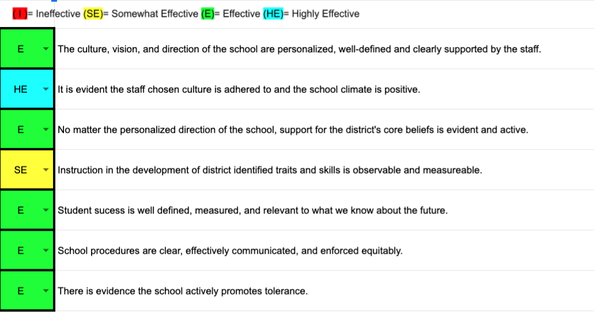
Reviewer Comments
- It's clear that LIM is the lead indicator on the culture and vision work at WES, but it's also true that the staff is working hard to weave in the Skills and Traits work. It's also commendable that they've instilled pride into their kids and staff by assigning jobs and committees to develop "purchase".
- It is very evident that there is a well-established culture (Leader In Me) in the building and there are multiple action teams that are staffed by every staff member in the building. It is clear that there is staff buy-in.
- The school also has different student lighthouse teams that students are on to help maintain the overall function of the building (Lost and Found Managers, Green Growing Team, Birthday Brigade, Recycling Renegades) to help maintain the overall function of the building.
- Teachers are building the skills and traits into their lessons. Lessons are not centered around the skills and traits but they will relate them back to the lesson.
- The Leader In Me vision and culture are very evident through everything they do. Action teams are clearly focused on the goals of the school. Washington is providing workshops for parents around the 7 Habits and Leader In Me. 7-Habits and Choices curriculum teaches tolerance by working on Thinking Win-Win, Synergizing, and other public victories.
- Washington is doing a fantastic job promoting the district's skills and traits and aligning those with what they already practice. They continue to head in the right direction. The atmosphere is positive and calm.
- Clear process in place to revisit vision and mission to determine its relevance. Leader in Me focus was on a strong positive trajectory as of last March 2020. Utilizing Early Release Fridays for Leader in Me work. The Lighthouse Team is comprised of 9 staff members, with smaller action teams. Every staff member is part of one of the teams. A student Lighthouse Team has about 14 fourth graders.
- The Traits & Skills are embedded throughout the daily discussions that teachers have with students, supported by the posters that align the 7 Habits with Traits & Skills.
- It's clear throughout the building that there is a deliberate focus on the CCSD Traits & Skills as well as the 7 Habits.
Compass Comments
Washington has a long tradition as a Leader in Me school and of adhering to this chosen culture. In recent years they have done much to “sharpen their saw” by revisiting processes, and they strive to be a model program with the application of their lighthouse committee. It is evident the staff has done a crosswalk between their Leader in Me habits and the district-chosen traits and skills. We witnessed teachers building skills and traits into lessons taught. We encourage the staff to continue to expand on this work they have begun.
Washington has a long tradition as a Leader in Me school and of adhering to this chosen culture. In recent years they have done much to “sharpen their saw” by revisiting processes, and they strive to be a model program with the application of their lighthouse committee. It is evident the staff has done a crosswalk between their Leader in Me habits and the district-chosen traits and skills. We witnessed teachers building skills and traits into lessons taught. We encourage the staff to continue to expand on this work they have begun.
Section II-Focus on Student Health and Social-Emotional Wellness
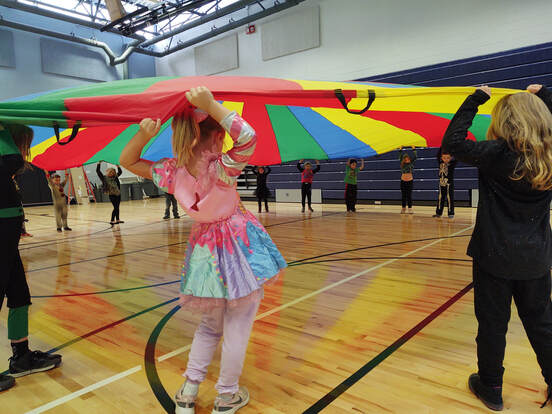 Collaborative play is key to student social-emotional wellness.
Collaborative play is key to student social-emotional wellness.
Staff Reflection
We were looking forward to having an increased level of support through 2 counselors provided through the School Mental Health Professional grant awarded last spring, but unfortunately, the funding was pulled due to the pandemic. We were fortunate to be awarded separate grant funding to support providing one counselor this year, yet there has been a lot of transition in that position making it difficult to establish an effective system of student supports. We have been able to continue other forms of support provided through the LIM program and through an increase in school-based counseling services provided by our community partners (Gateway and Sol Vista). The new building design with a recovery room and a sensory room has helped by providing us with areas to address students' behavioral and emotional needs more effectively and safely. The use of mindfulness practices continues to be sporadic, but perhaps with an upcoming training, more staff members will begin to utilize these again.
We were looking forward to having an increased level of support through 2 counselors provided through the School Mental Health Professional grant awarded last spring, but unfortunately, the funding was pulled due to the pandemic. We were fortunate to be awarded separate grant funding to support providing one counselor this year, yet there has been a lot of transition in that position making it difficult to establish an effective system of student supports. We have been able to continue other forms of support provided through the LIM program and through an increase in school-based counseling services provided by our community partners (Gateway and Sol Vista). The new building design with a recovery room and a sensory room has helped by providing us with areas to address students' behavioral and emotional needs more effectively and safely. The use of mindfulness practices continues to be sporadic, but perhaps with an upcoming training, more staff members will begin to utilize these again.
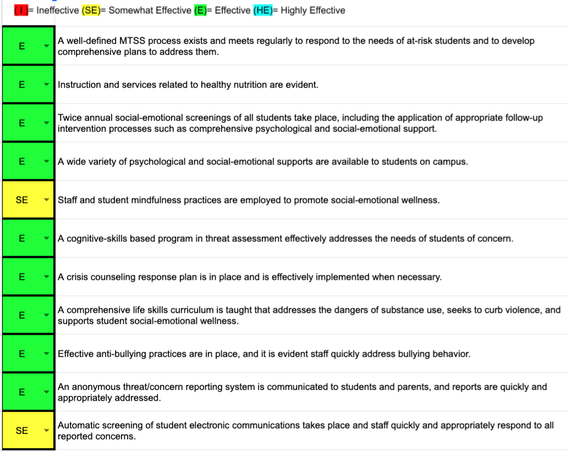
Reviewer Comments
- We, as a district, need to look into why Gaggle isn't being utilized at the K-5 level. From there, we should ask the question of whether or not we should indeed be using it.
- I look forward to WES having a consistent counselor, which will surely support the building even more."
- The district needs to address the possibility of implementing gaggle at the K-5 level. This would clearly be beneficial.
- The district will also be looking at implementing a new Chromebook management system
- The Lighthouse team is in place to look at school-wide data in many areas to make decisions for supports. A strong School Wellness Team has taken charge of promoting healthy choices with physical activity and nutrition. The tech teacher directly teaches lessons on nutrition. Teachers teach the first 8 days which includes a section on providing a space and time to calm down.
- I saw staff talking to students calmly and being patient. I saw students respond well to Choices and a teacher who played calming music while the students worked.
- The school has a clear process for identifying students who need support and putting RTI/APAS plans in place for them. The Lighthouse Team manages the plans. Unfortunately, Washington has experienced a high turnover rate in their SHP position this year. They have had three. There are some teachers that utilize strategies to allow students a place/opportunity to "recover" their social-emotional well-being.
- It was clear from walkthrough observation that interventionists are embedded throughout the classrooms to support learners.
Compass Comments
The Washington staff is making steady progress on living up to the district’s first core belief. The administration makes good use of the district-provided threat assessment. We encourage the staff to delve deeper into the use of mindfulness practices as a means by which to help students correct their own behavior. The staff says it feels it needs to better monitor student online behavior, but the district admits it dropped the ball on this front by not providing the proper platform by which to do so.
The Washington staff is making steady progress on living up to the district’s first core belief. The administration makes good use of the district-provided threat assessment. We encourage the staff to delve deeper into the use of mindfulness practices as a means by which to help students correct their own behavior. The staff says it feels it needs to better monitor student online behavior, but the district admits it dropped the ball on this front by not providing the proper platform by which to do so.
Section III-Focus on Innovative Instruction
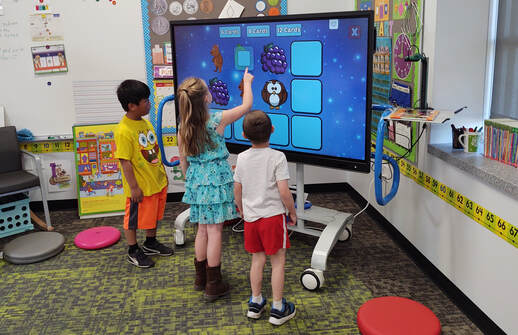 Modern technology tools support innovative instruction.
Modern technology tools support innovative instruction.
Staff Reflection
I am starting to hear teachers incorporate references to the skills and traits more regularly during instruction, and of course, there is a strong alignment between the 7-Habits and the skills and traits, yet we still need to determine how to measure students' development of the traits and skills. The uncertainty created by the possibility of classes needing to go virtual at any given time has provided opportunities for many teachers to grow in their use of instructional technology, which has been a good thing in many ways, yet the restrictions due to the pandemic have made it more difficult for teachers to facilitate engaging, collaborative, and hands-on learning experiences. We have made an effort to continue to provide students with opportunities to participate in activities such as Student Lighthouse Team, Yearbook, and various leadership roles, yet our offerings have been impacted by current restrictions. Our master schedule needed to be modified this year, but we were still able to maintain the things that were important to us and continue to provide as much time as possible for Life Skills classes, and ensure students aren't missing important instruction by intentionally scheduling dedicated time for interventions (WIN times). The pillars of instruction are still reinforced through instructional feedback, yet a decrease in available PD time has made it more difficult to make progress with engagement and assessment.
I am starting to hear teachers incorporate references to the skills and traits more regularly during instruction, and of course, there is a strong alignment between the 7-Habits and the skills and traits, yet we still need to determine how to measure students' development of the traits and skills. The uncertainty created by the possibility of classes needing to go virtual at any given time has provided opportunities for many teachers to grow in their use of instructional technology, which has been a good thing in many ways, yet the restrictions due to the pandemic have made it more difficult for teachers to facilitate engaging, collaborative, and hands-on learning experiences. We have made an effort to continue to provide students with opportunities to participate in activities such as Student Lighthouse Team, Yearbook, and various leadership roles, yet our offerings have been impacted by current restrictions. Our master schedule needed to be modified this year, but we were still able to maintain the things that were important to us and continue to provide as much time as possible for Life Skills classes, and ensure students aren't missing important instruction by intentionally scheduling dedicated time for interventions (WIN times). The pillars of instruction are still reinforced through instructional feedback, yet a decrease in available PD time has made it more difficult to make progress with engagement and assessment.
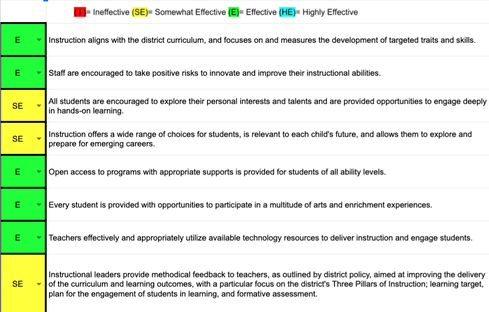
Reviewer Comments
- Washington uses primarily traditional instructional practices but does them well. Moving forward, it does seem like a focus on a broader variety of instructional strategies might serve the building well.
- Washington staff have done a great job of utilizing the Clevertouch boards and allowing the students to interact with the boards directly. I would agree that they are effective in their utilization of their technology but there is still work to be done throughout the building to establish healthy and effective use of the technology.
- Having students apply for 'jobs' is a wonderful way to encourage future thinking and build skills they will need for real life. The schedule lends itself to choice through the WIN time and I would encourage teachers to utilize that time to provide student choice through projects.
- I saw a lot of Clever Touch and Chromebook usage. A couple of teachers used a microphone to amplify their voices. Allowing students to do passion projects keeps learning fun and interesting. I love the combo classes.
- The staff has utilized the Cluster Grouping Model to build a schedule that accommodates less than desirable FTE situations and ultimately some mixed-grade classrooms. In those classrooms, teachers appear to be doing the best job possible to run lesson plans for two grade levels side-by-side.
Compass Comments
The Washington staff aligns instruction with the district curriculum in a very traditional fashion. This means students don’t have a lot of voice and choice in what they learn. Interventions for students who are falling behind are still among the best in the district. The Washington principal does not provide sufficient, methodical feedback to teachers in writing aimed at improving instruction.
The Washington staff aligns instruction with the district curriculum in a very traditional fashion. This means students don’t have a lot of voice and choice in what they learn. Interventions for students who are falling behind are still among the best in the district. The Washington principal does not provide sufficient, methodical feedback to teachers in writing aimed at improving instruction.
Section IV-Focus on Equity of Opportunity
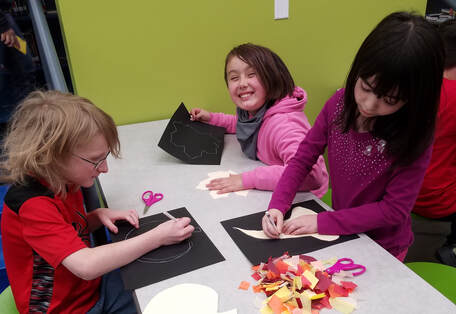 Students use the new maker space to complete engaging activities.
Students use the new maker space to complete engaging activities.
Staff Reflection
Last spring, teachers engaged in a shared decision-making process to determine how allocated FTE would be utilized to best meet the needs of our school (staff and students). This resulted in unique solutions being created to help minimize large class sizes by creating 2 combined grade-level classrooms for 2nd-3rd grades and for 4th-5th grades. This provided an opportunity to implement a "cluster grouping" model within these grades which actually helped accommodate the need to provide pullout services while still adhering to classroom cohort guidelines. We continued to utilize the collaborative process of creating class lists for this year by considering student needs and ensuring class lists are balanced. It is still difficult to ensure all students have access to accelerated learning opportunities since required interventions often create situations where students are pulled from relevant learning opportunities, yet our schedule helps minimize this impact by honoring core instructional times and Life Skills instructional times. Teachers have the opportunity to provide enrichment activities during WIN time, yet students receiving interventions during that time are not able to access the same activities.
Last spring, teachers engaged in a shared decision-making process to determine how allocated FTE would be utilized to best meet the needs of our school (staff and students). This resulted in unique solutions being created to help minimize large class sizes by creating 2 combined grade-level classrooms for 2nd-3rd grades and for 4th-5th grades. This provided an opportunity to implement a "cluster grouping" model within these grades which actually helped accommodate the need to provide pullout services while still adhering to classroom cohort guidelines. We continued to utilize the collaborative process of creating class lists for this year by considering student needs and ensuring class lists are balanced. It is still difficult to ensure all students have access to accelerated learning opportunities since required interventions often create situations where students are pulled from relevant learning opportunities, yet our schedule helps minimize this impact by honoring core instructional times and Life Skills instructional times. Teachers have the opportunity to provide enrichment activities during WIN time, yet students receiving interventions during that time are not able to access the same activities.
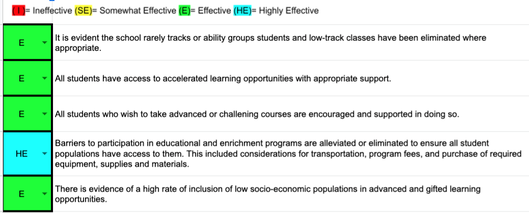
Reviewer Comments
Compass Comments
The Washington staff uses Leader in Me principles to ensure students experience equitable opportunities. Whenever possible, barriers to access higher-level learning are removed. The general philosophy is to allow each student to participate in enriching activities. These are accentuated through WIN Time (What I Need) and WIGs (Wildly Important Goals).
- By creating a WIN time teachers have the opportunity to provide extensions for students. Also, the combo classes have provided four grade levels with classes of high achieving students purposely grouped to extend their learning.
- I think the school is doing a great job ensuring that all students get the help and resources needed for them.
Compass Comments
The Washington staff uses Leader in Me principles to ensure students experience equitable opportunities. Whenever possible, barriers to access higher-level learning are removed. The general philosophy is to allow each student to participate in enriching activities. These are accentuated through WIN Time (What I Need) and WIGs (Wildly Important Goals).
Section V-Focus on Opportunities for Learning Experiences
Staff Reflection
We have done the best we can to continue to provide additional learning opportunities for students through the Student Lighthouse Team, Safety Patrol, Student Leadership Roles, and Yearbook, but we were unable to maintain offerings that have been available in the past (e.g. 100-mile club, After School Sports). I do believe what we have been able to maintain helps reinforce the 7-Habits and the desired skills and traits for student participants.
We have done the best we can to continue to provide additional learning opportunities for students through the Student Lighthouse Team, Safety Patrol, Student Leadership Roles, and Yearbook, but we were unable to maintain offerings that have been available in the past (e.g. 100-mile club, After School Sports). I do believe what we have been able to maintain helps reinforce the 7-Habits and the desired skills and traits for student participants.
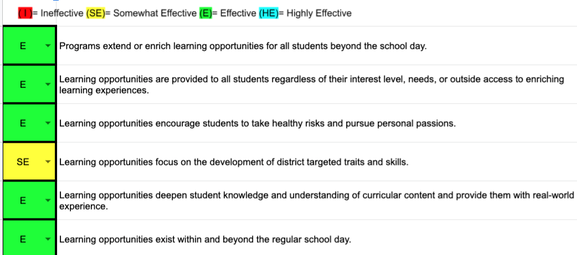
Reviewer Comments
- Giving the students the ability to have a choice in their lighthouse jobs is a great way for students to learn skills and traits outside of the school day.
- The student Lighthouse team meets before school. The student 'jobs' is a great way for students to participate in real-life application of skills and allows for students to be involved in areas they are interested in.
- The Maker Space is great. In-school field trips are a fantastic idea. I think it's wonderful that students get the opportunity to have jobs; Recycle Renegades, Property Manager, etc. Having leadership opportunities are a great way for "quieter" students to speak up and gain confidence and learn some real-world skills.
Compass Comments
The team saw evidence of student work and progress posted throughout the school. Students are getting to have some choice in school procedures through the implementation of a student Lighthouse committee. Once again, we challenge the staff to explicitly apply the district-adopted traits and skills to much of this work.
The team saw evidence of student work and progress posted throughout the school. Students are getting to have some choice in school procedures through the implementation of a student Lighthouse committee. Once again, we challenge the staff to explicitly apply the district-adopted traits and skills to much of this work.
Section VI-Focus on Effective Assessment Procedures
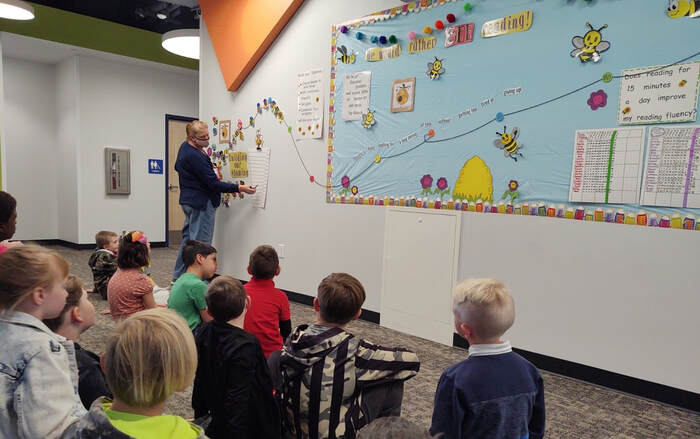 The Washington staff tracks student progress both individually and collectively.
The Washington staff tracks student progress both individually and collectively.
Staff Reflection
Established protocols for data discussions related to reading assessments are utilized for data days and regular PLCs, and progress monitoring is conducted every two weeks and evaluated by grade level teachers and interventionists every 6-weeks to inform instructional decisions and small group placements. There is a greater familiarity with the skills and traits this year, so teachers are beginning to incorporate these into their instruction, but we still need to work toward being able to measure students' development of these skills and traits.
Established protocols for data discussions related to reading assessments are utilized for data days and regular PLCs, and progress monitoring is conducted every two weeks and evaluated by grade level teachers and interventionists every 6-weeks to inform instructional decisions and small group placements. There is a greater familiarity with the skills and traits this year, so teachers are beginning to incorporate these into their instruction, but we still need to work toward being able to measure students' development of these skills and traits.
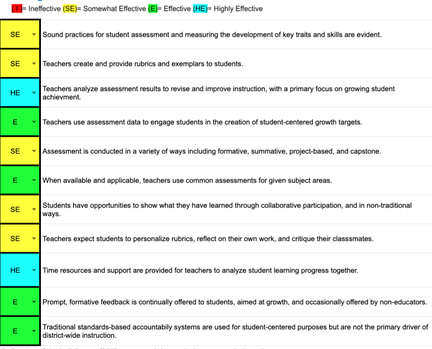
Reviewer Comments
Compass Comments
Washington has a wonderful tradition of effectively analyzing benchmark assessment results and using this to guide instruction and intervention. Staff time is allocated for this. We saw evidence of leadership portfolios being created by students and encourage the school to expand on its application of these across all grades and class levels. Though traits and skills appear to be addressed through instruction, we are not seeing an attempt to measure their development by students. Measurement of traits and skills. We also did not see much use of teacher-provided rubrics and exemplars applied to assessment.
- The use of the maker space to enhance learning and giving students a non-traditional way of showing their knowledge is proof of being effective in this area.
- PLCs are used effectively to look at reading and writing data to inform instruction. It is great to hear that the teachers are the ones leading the data discussions and that has transferred from just the interventionists.
- I think the school is doing great with assessment practices. They appear to use the data effectively.
- The school has a great system in place where all students have binders that contain data and goals set by students.
Compass Comments
Washington has a wonderful tradition of effectively analyzing benchmark assessment results and using this to guide instruction and intervention. Staff time is allocated for this. We saw evidence of leadership portfolios being created by students and encourage the school to expand on its application of these across all grades and class levels. Though traits and skills appear to be addressed through instruction, we are not seeing an attempt to measure their development by students. Measurement of traits and skills. We also did not see much use of teacher-provided rubrics and exemplars applied to assessment.
Section VII-Focus on Improvement of Instruction and Learning
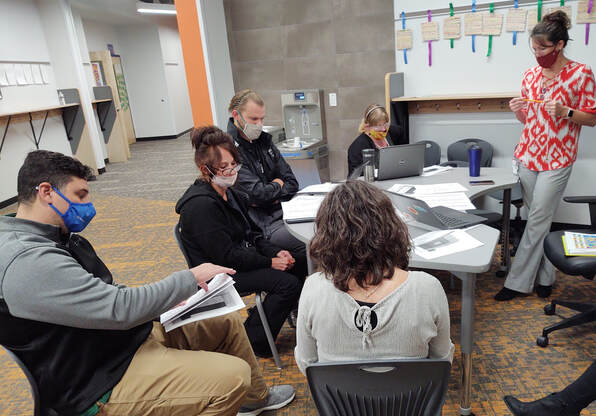 Washington has strong instructional leaders willing to share what they know.
Washington has strong instructional leaders willing to share what they know.
Staff Reflection
We continue to utilize the expertise of mentors within the building and the district induction program continues to offer high-quality support for new teachers. At the school level, our SLT will contribute to the decision-making process, but the IBS process is/will be used for decisions impacting the entire school. This process, even when being facilitated virtually last spring, has proven to be highly effective in promoting teacher/staff voice in the process and producing quality solutions for big decisions related to FTE and the master schedule. The SLT is involved in decisions related to early release PD plans and Action Team leaders have contributed to facilitating the PD offered on these days. The district-driven PD is relevant, but the fact that most district-level PD must be delivered virtually has impacted the efficacy/quality of training. The same can be said about utilizing outside expertise. We have taken advantage of our coaching services provided through the LIM, but it too had to be facilitated virtually and wasn't as effective as it could have been if offered in person. The use of our Instructional Technologist has improved greatly this year! We modified the master schedule to make sure she was available to support teachers with the use of technology in the classrooms, and she has done a better job of promoting her services and scheduling times with teachers. The fact that we now have student technology readily available in all classrooms has helped, too.
We continue to utilize the expertise of mentors within the building and the district induction program continues to offer high-quality support for new teachers. At the school level, our SLT will contribute to the decision-making process, but the IBS process is/will be used for decisions impacting the entire school. This process, even when being facilitated virtually last spring, has proven to be highly effective in promoting teacher/staff voice in the process and producing quality solutions for big decisions related to FTE and the master schedule. The SLT is involved in decisions related to early release PD plans and Action Team leaders have contributed to facilitating the PD offered on these days. The district-driven PD is relevant, but the fact that most district-level PD must be delivered virtually has impacted the efficacy/quality of training. The same can be said about utilizing outside expertise. We have taken advantage of our coaching services provided through the LIM, but it too had to be facilitated virtually and wasn't as effective as it could have been if offered in person. The use of our Instructional Technologist has improved greatly this year! We modified the master schedule to make sure she was available to support teachers with the use of technology in the classrooms, and she has done a better job of promoting her services and scheduling times with teachers. The fact that we now have student technology readily available in all classrooms has helped, too.
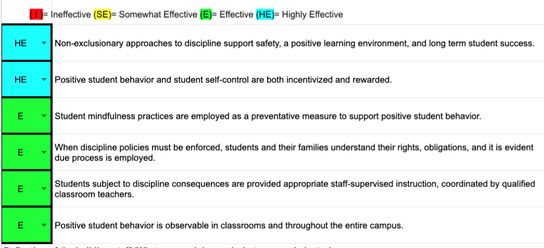
Reviewer Comments
Compass Comments
Washington makes tremendous use of the district-provided new teacher induction program. Its School Lighthouse Team could be a model for how all schools can create an effective collaborative decision-making process. It is also clear the staff has made good progress toward the use of technology through district-provided and building-level professional development. We encourage focus to shift toward how the staff can better support parents in supporting the academic progress of their children.
- The use of the Interest-Based Strategy to make building decisions is used highly effectively at Washington. A LIM coach has been used to work with Brian and the staff to focus PD for staff. The Lighthouse team is the group that decides the PD needs for the staff and many of the members lead the PD.
- Even with less PD time, this school still seems to continue to grow, keeping the student outcome first and foremost.
Compass Comments
Washington makes tremendous use of the district-provided new teacher induction program. Its School Lighthouse Team could be a model for how all schools can create an effective collaborative decision-making process. It is also clear the staff has made good progress toward the use of technology through district-provided and building-level professional development. We encourage focus to shift toward how the staff can better support parents in supporting the academic progress of their children.
Section VIII-Focus on Support for Positive Student Behavior
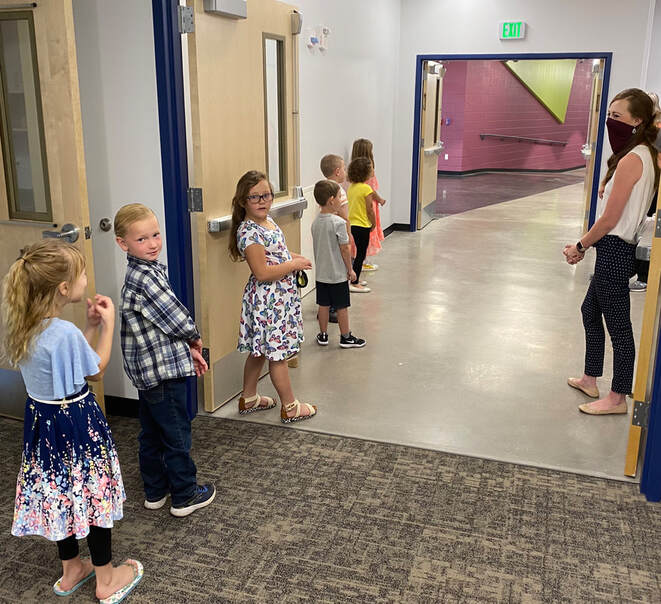 Daily routines play a big part in supporting good behavior of students.
Daily routines play a big part in supporting good behavior of students.
Staff Reflection
The extreme behaviors of very few students can often overshadow the overwhelmingly positive behaviors of the vast majority, but the staff does a good job of establishing and reinforcing consistent expectations to create a predictable environment for students and utilize proactive language to recognize and reinforce positive student behaviors. Our trimester award system is designed to recognize students for exhibiting positive behaviors by recognizing their leadership exhibited through the use of the 7-Habits. We continue to make improvements in behavior management practices and teachers have participated in the RtI process to work through the problem-solving process with parents and other staff members to implement interventions to help support students in the school setting. We continue to face various challenges, yet the overall climate of the school is indicative of positive student behavior throughout the building.
The extreme behaviors of very few students can often overshadow the overwhelmingly positive behaviors of the vast majority, but the staff does a good job of establishing and reinforcing consistent expectations to create a predictable environment for students and utilize proactive language to recognize and reinforce positive student behaviors. Our trimester award system is designed to recognize students for exhibiting positive behaviors by recognizing their leadership exhibited through the use of the 7-Habits. We continue to make improvements in behavior management practices and teachers have participated in the RtI process to work through the problem-solving process with parents and other staff members to implement interventions to help support students in the school setting. We continue to face various challenges, yet the overall climate of the school is indicative of positive student behavior throughout the building.
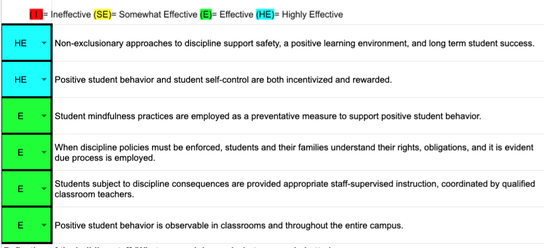
Reviewer Comments
- Awards assemblies are utilized to promote positive behavior through the 7 Habits. Teachers use a variety of technology to reward students through Class Dojo and Class Tag. Washington created school-wide expectations and reviewed them with the staff and students when the building opened.
- I didn't see any major disruptive behavior. Students seemed tolerant of each other and teachers appeared to have patience while waiting for some students to do what they needed to do. There are rewards for good behavior and students seem to know what's expected. I noted some classrooms had expectations posted on walls.
- Mr. Zamarripa uses a disciplinary approach where every effort is made to keep students in school as opposed to sending them home for poor behavior.
Compass Comments
Positive student behavior was observable throughout the entire building. This is a testament to excellent classroom management and positive school culture. Parents and students appear to understand how and why discipline policies are applied. Parents are appreciative of the communication efforts the school and teachers make. We encourage the school to explore some less traditional means of communication (such as video, social media, etc). We also encourage a greater application of mindfulness practices so students can be supported in managing their own emotions and behavior when necessary.
Positive student behavior was observable throughout the entire building. This is a testament to excellent classroom management and positive school culture. Parents and students appear to understand how and why discipline policies are applied. Parents are appreciative of the communication efforts the school and teachers make. We encourage the school to explore some less traditional means of communication (such as video, social media, etc). We also encourage a greater application of mindfulness practices so students can be supported in managing their own emotions and behavior when necessary.
Section IX-Focus on Resource Acquisition and Maintenance of a Safe Learning Environment
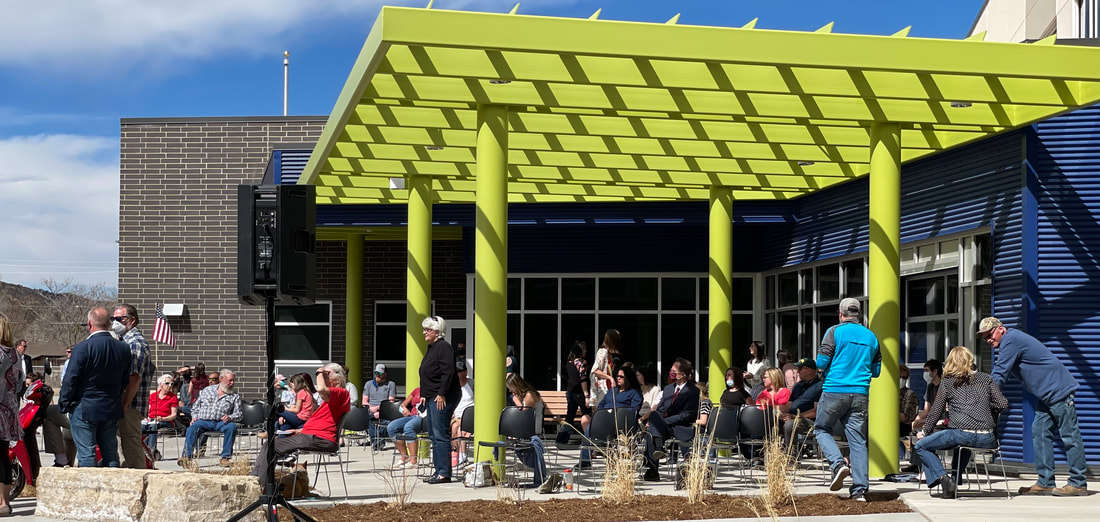 The Washington staff played a key role in securing funding for a new facility.
The Washington staff played a key role in securing funding for a new facility.
Staff Reflection
This year has been the culmination of our resource acquisition over the last several years with our new building construction being completed, new instructional technology being provided, and new playgrounds being installed! Teachers continue to utilize district-provided instructional resources as they learn to effectively integrate the use of new instructional technology. Safety issues with the new building are being resolved with the contractors and/or through the district maintenance department as needed. Although we have had a lot of transition in the Behavioral Health/Counseling position which supports our Care Bear Cupboard program, we have still been able to take advantage of the outside resources to be able to provide backpacks full of food to send home with students who may otherwise be without every other week.
This year has been the culmination of our resource acquisition over the last several years with our new building construction being completed, new instructional technology being provided, and new playgrounds being installed! Teachers continue to utilize district-provided instructional resources as they learn to effectively integrate the use of new instructional technology. Safety issues with the new building are being resolved with the contractors and/or through the district maintenance department as needed. Although we have had a lot of transition in the Behavioral Health/Counseling position which supports our Care Bear Cupboard program, we have still been able to take advantage of the outside resources to be able to provide backpacks full of food to send home with students who may otherwise be without every other week.
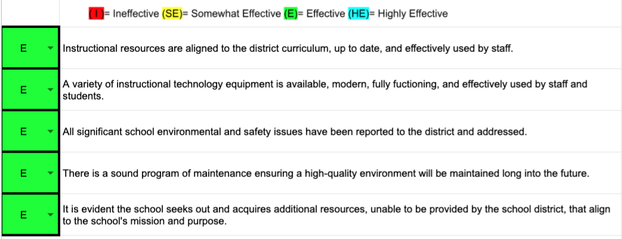
Reviewer Comments
- Washington had the highest number of the students effectively using the Clever Touch display boards interactively and is moving in the right direction of learning how to use their resources to their fullest potential. The new building has provided some wonderful safety features built-in. Staff and students responded by feeling safe at Washington.
- It appears the school reaches out to acquire resources they can use. They don't waste money, even turning it away if they don't feel they can utilize it fully. This is a new building. I didn't see much of anything unsafe about it or the environment.
- Staff is using the building spaces in a great way - collaborative spaces for adults and small group work areas.
Compass Comments
We wish to acknowledge once again that if not for the advocacy of the Washington staff, administration, and parents, a community school on the site at Washington might no longer exist. This is a testament to dedication and commitment. The school is absolutely beautiful, which is a testament to the wonderful design participation of the staff. The staff also applied for and secured a playground grant that helped the district leverage construction funds for other aspects of the facility. With a brand new facility, we encourage the staff to ensure it remains like new for years to come!
We wish to acknowledge once again that if not for the advocacy of the Washington staff, administration, and parents, a community school on the site at Washington might no longer exist. This is a testament to dedication and commitment. The school is absolutely beautiful, which is a testament to the wonderful design participation of the staff. The staff also applied for and secured a playground grant that helped the district leverage construction funds for other aspects of the facility. With a brand new facility, we encourage the staff to ensure it remains like new for years to come!
Section XI - Focus on Early Literacy
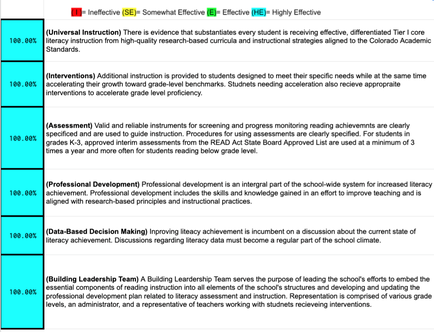
Staff Reflection
The work we have done that is specific to literacy instruction over the past four years has really helped build the foundation for sustaining best instructional practices. The support of the District Literacy Coach has been essential to our continual progress, especially through the support of new teachers, but also through ongoing support for returning teachers who may be in need. The reopening guidelines we had to follow created some challenges with our ability to continue to provide the instructional program we have worked to create over the years, but we were able to work within the identified parameters and continue to provide effective intervention support through a modified walk-to-read model and designated WIN times. The instructional leaders in both the Title I and SpEd departments play a huge role in sustaining our efforts to provide appropriate tier II and tier III interventions for all students requiring intervention. Assessment practices through the use of approved
The work we have done that is specific to literacy instruction over the past four years has really helped build the foundation for sustaining best instructional practices. The support of the District Literacy Coach has been essential to our continual progress, especially through the support of new teachers, but also through ongoing support for returning teachers who may be in need. The reopening guidelines we had to follow created some challenges with our ability to continue to provide the instructional program we have worked to create over the years, but we were able to work within the identified parameters and continue to provide effective intervention support through a modified walk-to-read model and designated WIN times. The instructional leaders in both the Title I and SpEd departments play a huge role in sustaining our efforts to provide appropriate tier II and tier III interventions for all students requiring intervention. Assessment practices through the use of approved
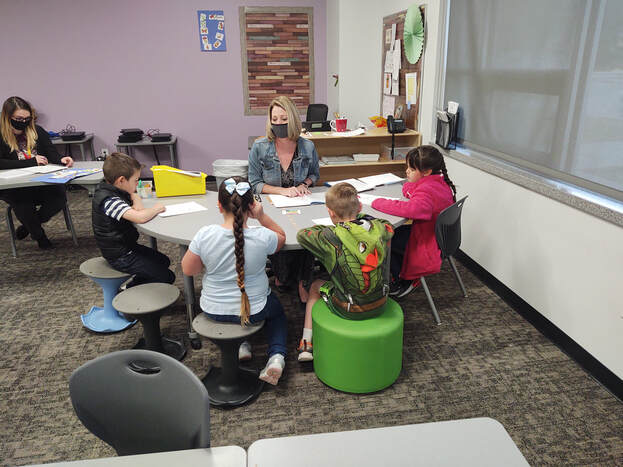 Washington has a strong program of reading intervention for students who are falling behind.
Washington has a strong program of reading intervention for students who are falling behind.
assessments are applied appropriately for benchmark assessments and progress monitoring. The established assessment and progress monitoring calendar/schedule is adhered to to ensure consistent data collection, and all testers are required to shadow and calibrate to ensure valid data is collected. Every 6 weeks, grade level teachers have data discussions w/ Title and SPED to ensure students are receiving the correct instruction and/or intervention (to the best of our ability while maintaining groups by cohort). Professional development hasn't quite been the same this year, but virtual training and collaboration opportunities have been provided for reading interventionists to promote professional growth and ensure effective instructional practices are being provided by all instructional staff. We still have some teachers who rely heavily upon the support and expertise provided through our Title I teachers, yet most classroom teachers are able to access their data and utilize the various functions available to them through the tool. Likewise, the instructional staff is improving in their ability to utilize formative assessment data and apply it to instruction.
Final Rating and Next Step Recommendations
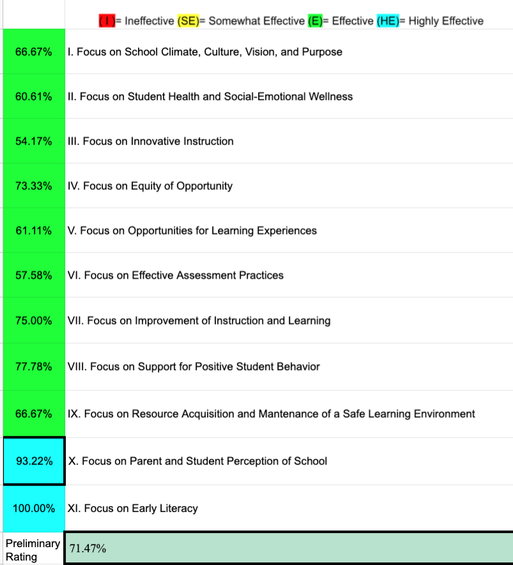
Washington Elementary School’s final rating for 2021 is 71.47 %. This lands the school in the Effective category.
The Compass Committee recognizes Washington Elementary School’s effort to align its practices to the district’s vision, mission, core beliefs, and attainment of its graduate profile traits and skills.
This is only the second year Washington has been rated according to this rubric, and 2021 is an improvement over the prior-year rating.
As a result of this review, the Cañon City Schools Compass Committee suggests the following areas of focus to further improve student learning outcomes:
-Washington employs a very traditional instructional model. With the move to a facility designed for more student collaboration, a one-to-one device program in place, and the district’s desire to develop certain traits and skills in students, we encourage the staff to make use of the building’s collaborative nature as its design intends, especially through the incorporation of Project-Based Learning opportunities that emphasize the development of the district adopted traits and skills.
-Through administrator and coach observation and feedback, codify effective staff practice in the district’s three pillars of instruction, with a special focus on formative assessment and how it can promote and measure the development of our chosen traits and skills.
-Please continue implementation of newly learned literacy strategies, with an added expectation that general classroom teachers have greater access to, and greater knowledge of how to interpret and use student benchmark results to drive instructional decision-making.
-In the 2021-22 school year Washington Elementary School will receive an additional $333 per student allocation, thanks to federal ESSER III funding. A preliminary proposal was submitted by Washington to the district in April 2021 to guide how these dollars will be invested to keep the doors to the school open, catch students up on learning opportunities lost as a result of the COVID pandemic, and drive innovative education opportunities forward in alignment with our district vision, mission, core beliefs, and adopted traits and skills. Please review the feedback the district has offered on your proposal and submit a revised plan for approval, then see to it that each initiative is successfully implemented for the benefit of improved student learning opportunities and outcomes.
The Compass Committee recognizes Washington Elementary School’s effort to align its practices to the district’s vision, mission, core beliefs, and attainment of its graduate profile traits and skills.
This is only the second year Washington has been rated according to this rubric, and 2021 is an improvement over the prior-year rating.
As a result of this review, the Cañon City Schools Compass Committee suggests the following areas of focus to further improve student learning outcomes:
-Washington employs a very traditional instructional model. With the move to a facility designed for more student collaboration, a one-to-one device program in place, and the district’s desire to develop certain traits and skills in students, we encourage the staff to make use of the building’s collaborative nature as its design intends, especially through the incorporation of Project-Based Learning opportunities that emphasize the development of the district adopted traits and skills.
-Through administrator and coach observation and feedback, codify effective staff practice in the district’s three pillars of instruction, with a special focus on formative assessment and how it can promote and measure the development of our chosen traits and skills.
-Please continue implementation of newly learned literacy strategies, with an added expectation that general classroom teachers have greater access to, and greater knowledge of how to interpret and use student benchmark results to drive instructional decision-making.
-In the 2021-22 school year Washington Elementary School will receive an additional $333 per student allocation, thanks to federal ESSER III funding. A preliminary proposal was submitted by Washington to the district in April 2021 to guide how these dollars will be invested to keep the doors to the school open, catch students up on learning opportunities lost as a result of the COVID pandemic, and drive innovative education opportunities forward in alignment with our district vision, mission, core beliefs, and adopted traits and skills. Please review the feedback the district has offered on your proposal and submit a revised plan for approval, then see to it that each initiative is successfully implemented for the benefit of improved student learning opportunities and outcomes.
